"He Cheated" Finally Answers: How Often Do Males Compete in Women’s Sports?
And how many win?
Hi friends and welcome newcomers!
“But it doesn’t happen often” is a persistent myth designed to minimize the impact of male1 (trans-identified) athletes in women’s sports. Now, thanks to an ever-expanding dataset displayed at HeCheated.org – an accusation I’ll get to in a moment — we can confirm that male2 athletes frequently wreak havoc on women’s opportunities, victories, and awards — in at least sixty sports, from cycling to volleyball, distance running to soccer.
He Cheated
He Cheated is the brainchild of an anonymous person I’ll call Athena because Athena was the Greek goddess of numbers, among other things. The website allows you to search by athlete, sport, year, prize money, and more.
Athena is a former college athlete with experience playing recreational sports against male and female opponents, including male athletes who identify as trans. “I'm familiar with the differences between male and female athletic performance and the fiction that males turn into females with the use of wrong-sex hormones,” she says.
She had heard the “doesn’t happen often” myth.
She knew it was “false based on stories in the news almost daily, but no one knew the extent. How could they? This information was not being collected by athletic organizations on purpose. I realized I had to do something.
No girl should ever be told that her athletic aspirations and accomplishments are less important [than a boy’s].”
Athena stays anonymous “because this would not be well received by my employer. I know how vicious trans activists can be. I value my privacy.”
She began in early 2024 with a database compiled by the Women’s Sports Policy Working Group. She moved on to SheWon.org, a site that allows female athletes to upload their own data. Now she forages for and uploads data “so people see the pattern.”
However, it's “a severe undercount,” cautions Athena. She finds more instances every day.
Sports organizations (schools, colleges, the NCAA, etc.) have no reporting requirements. San Jose State University, for instance, remains essentially mum even after one of their female volleyball players joined an NCAA lawsuit and five colleges boycotted the school when a male player on the women’s volleyball team was outed this year.
Deceptive practices leave girls such as 14-year-old Washington runner Ahnaleigh Wilson feeling “blindsided” when they suddenly realize, often at starting line, that one of their opponents is male.
The data: Does this look like “not often” to you?
According to He Cheated:
9,258: Number of times males have participated in female events
5,081: Number of males who have claimed first, second, or third in female events
436: Number of women’s National Championship medals that were given to men
133: Number of women’s World and Olympic Championship medals that were given to men3
But did they win?
Another bogus justification is that males in women’s sports “don’t really have an unfair advantage” because they don’t always win. But athletes who take steroids don’t always win, either. The objection in both cases is not that they always win, but that it’s always unfair.
Still, curiosity about winning is valid. Check this out:
3,058: Number of first-place finishes by males in female events
313: Number of National Championships won by males in female events
77: Number of World and Olympic Championships won by males in female events
Why do male athletes win so often?
I think you know the answer. As do they. They’re males in the female category, where they do not belong. At every age, males are, on average, taller, stronger, and faster. Which has been proven by a hundred years of sports data. And is obvious. Which is why the all-female category exists.
Also, many sports (volleyball, basketball, golf, ice hockey, lacrosse, tennis, hurdles, shot put, javelin, discus, and many more) have different rules, courts, or equipment for women and men to adjust for those sex differences in size, strength, and speed. Therefore, males who compete in the female category in these sports have a second advantage, such as driving from women’s (closer) tees in golf; spiking over a women’s (lower) volleyball net, and handling a women’s (smaller) basketball.
What about prize money?
$1,624,433: Amount of prize money “stolen,” as Athena puts it, from women and given to men
647: Number of women who were deprived of this prize money
$19,742: Amount of prize money granted to men in women’s cycling alone. Austin Phillips, for instance, took home $5,000 from the 2023 Belgian Waffle Ride and $8,000 from the 2023 Tour of Gila ride and another $800 as “Queen of the Mountain” that day. (“Transphobic outrage” ensued, according to the Pink News.) Ironically, the Tour of Gila offered equal prize money to men and women for the first time in 2023. But men pocketed all the men’s money — plus $8,800 of the women’s. Which does not add up to equal money, does it?
Trend over time
Let’s look at the trend – dramatically upward – over time.
Note that the number of male entrants grows exponentially despite the decreasing number of years (63, 10, 10, fewer than 5 so far).
National championships reflect the same upward spike.
The same trend holds for World and Olympic Championships.
How many male participants?
With males competing in 9,258 female events, you might expect there to be many thousands of individual male athletes involved. But athletes don’t become state champions, for instance, by competing in just one event. They compete first in dual meets, division meets, regional meets. Valentina Petrillo, the 51-year-old Italian Paralympian who won 11 Italian men’s national titles then “transitioned” in 2019, has already competed in 89 women’s events — despite admitting recently, “You can see I’m a man.”
706: Number of male athletes
13: Average number of events entered by each of those 706 males
Curious about male presence in particular sports? Here's a sampling.
Impact: How many girls and women are affected?
Here’s an illustration of how just two male athletes denied girls opportunities and awards a whopping 235 times.
But cheating?
What about the accusation: He Cheated? I wonder if it might be too harsh since modern rules often allow trans-identified, non-binary-identified, and DSD males into the female category. Here’s Athena:
“Cheating is acting dishonestly or unfairly. Any adult offered a spot on an under-fourteen team would turn it down, even if it were allowed, because it's unsportsmanlike. If motorbikes are allowed by the rules in a cycling race, yet they are only provided to a select few athletes, anyone choosing the motorbike over a bicycle and celebrating on the podium would be viewed as a cheat — and the entire race a farce.
“These men and boys are lying about their sex. They hide it. They know it's unfair. They have the option of competing against men, which many have done in the past, yet they compete against women.
“They are [also] violating the privacy of the women and girls [in] locker rooms. Voyeurism and indecent exposure are crimes. These men are openly committing these crimes.”
And what about boys who have been indoctrinated to believe they have a right to compete against girls?
“I think it's important to let them know what they're doing is wrong, and most importantly, let the women and girls know that they have someone who is unwaveringly on their side and putting them first for once.”
Athena’s on a roll; I’ll give her the final word. Her major concern?
“That women and girls will give up on sports, quitting before they have a chance to get started, because they know how frustrating and humiliating it is to lose to lesser-skilled boys.”
Other Stronger Women essays you might like:
As Martina Navratilova wrote in a guest column called “We Need to Refer to Male Athletes as Male, “The word for people with XY chromosomes is male. Male athletes have an advantage over female athletes because of their maleness. Males who identify as transgender may dress as they please. They’re still male.”
He Cheated includes in its database any males competing in all-female events: those with a trans, nonbinary or other gender identity; those with DSDs; and others who compete in games reserved for girls or women.
All data cited here is as of 10/19/2024; He Cheated is continually being updated.





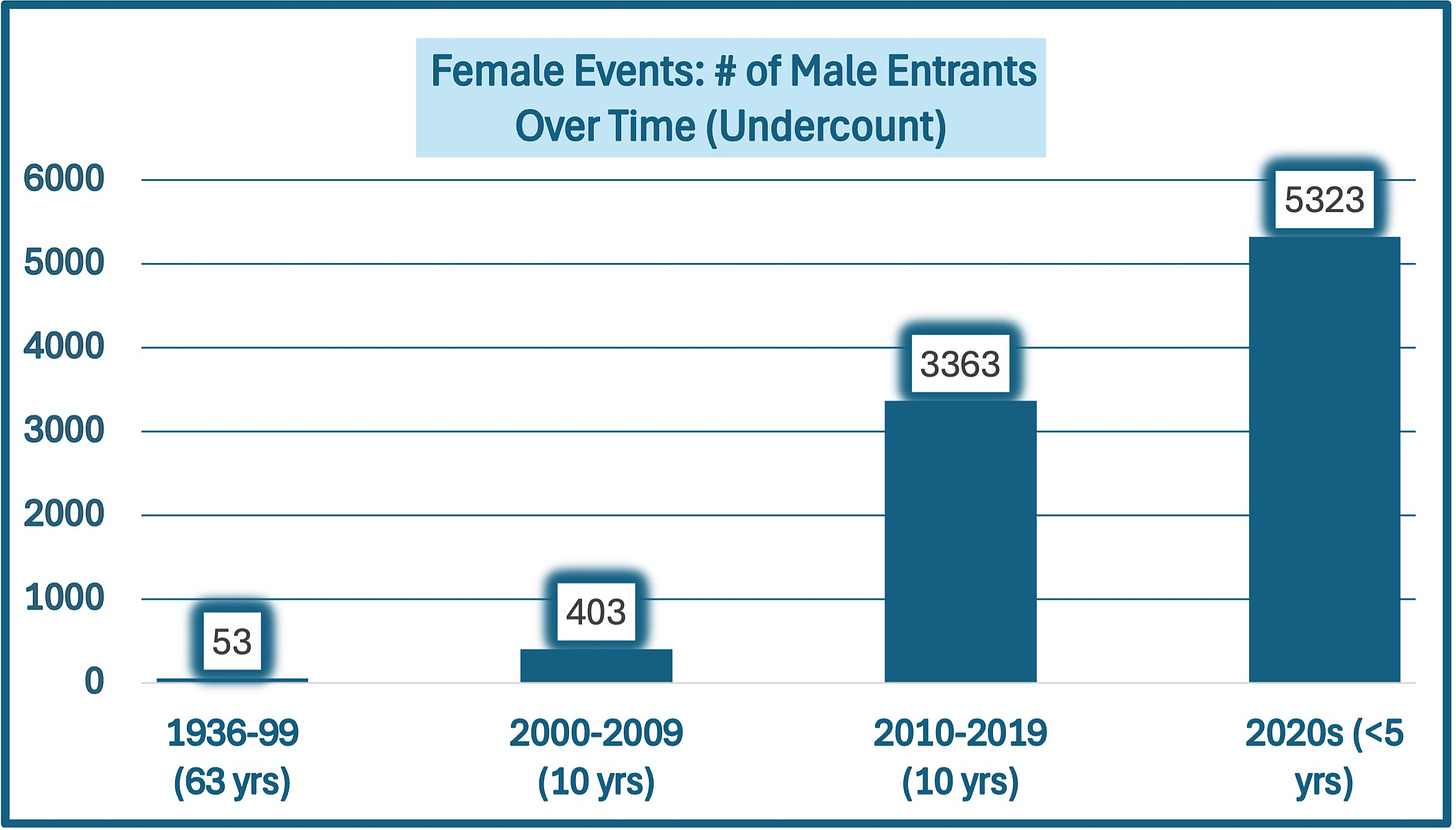
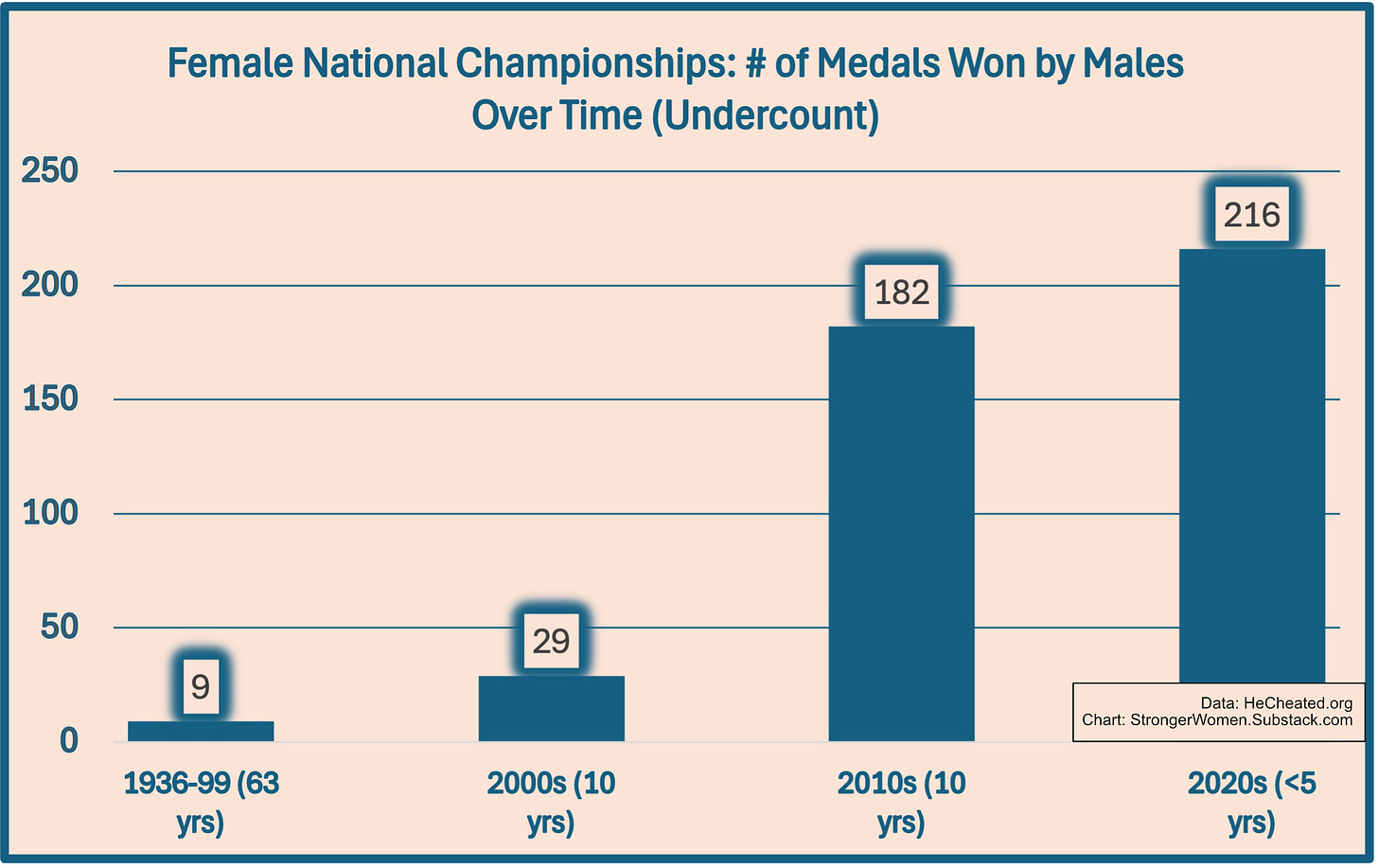
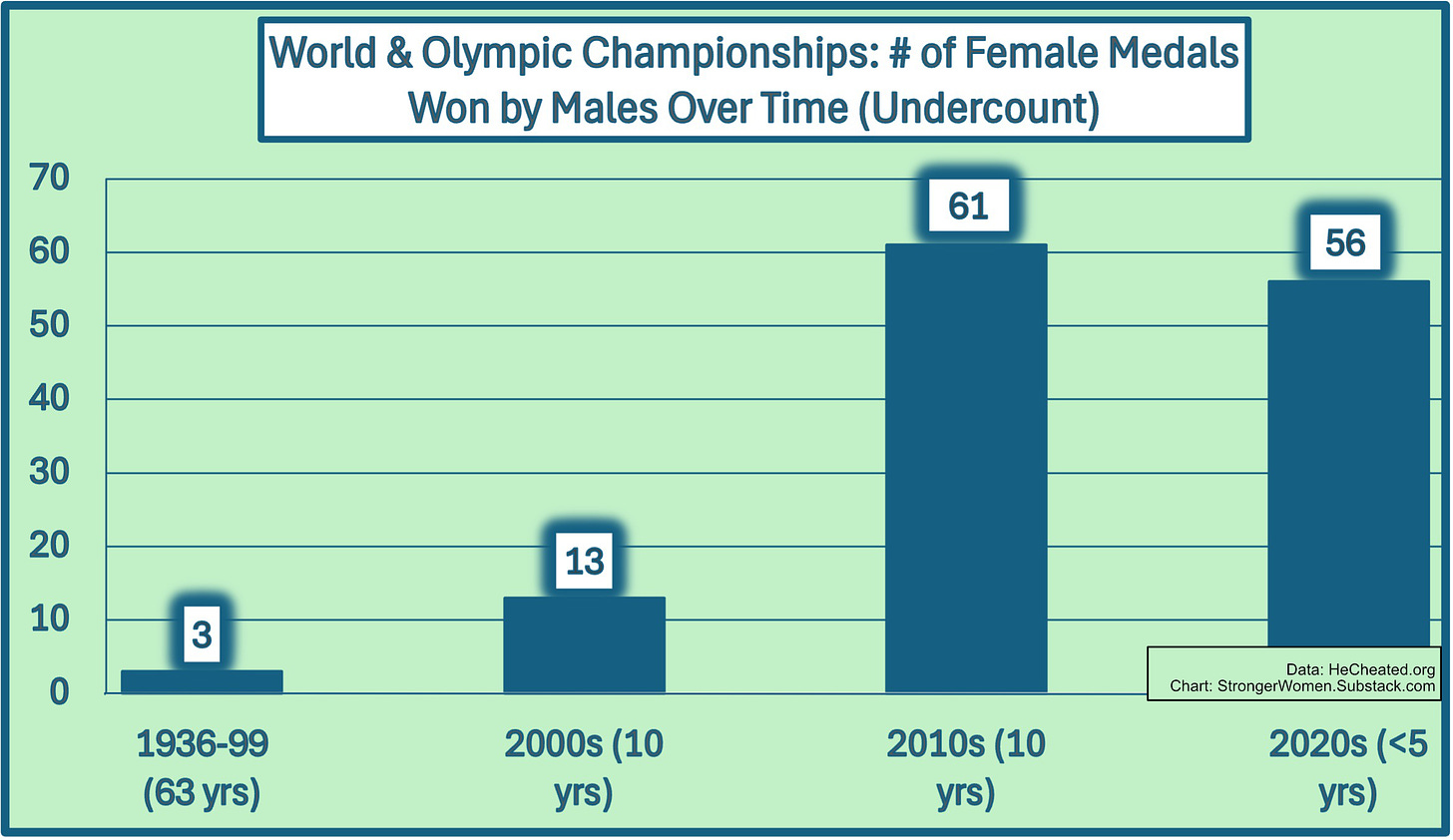
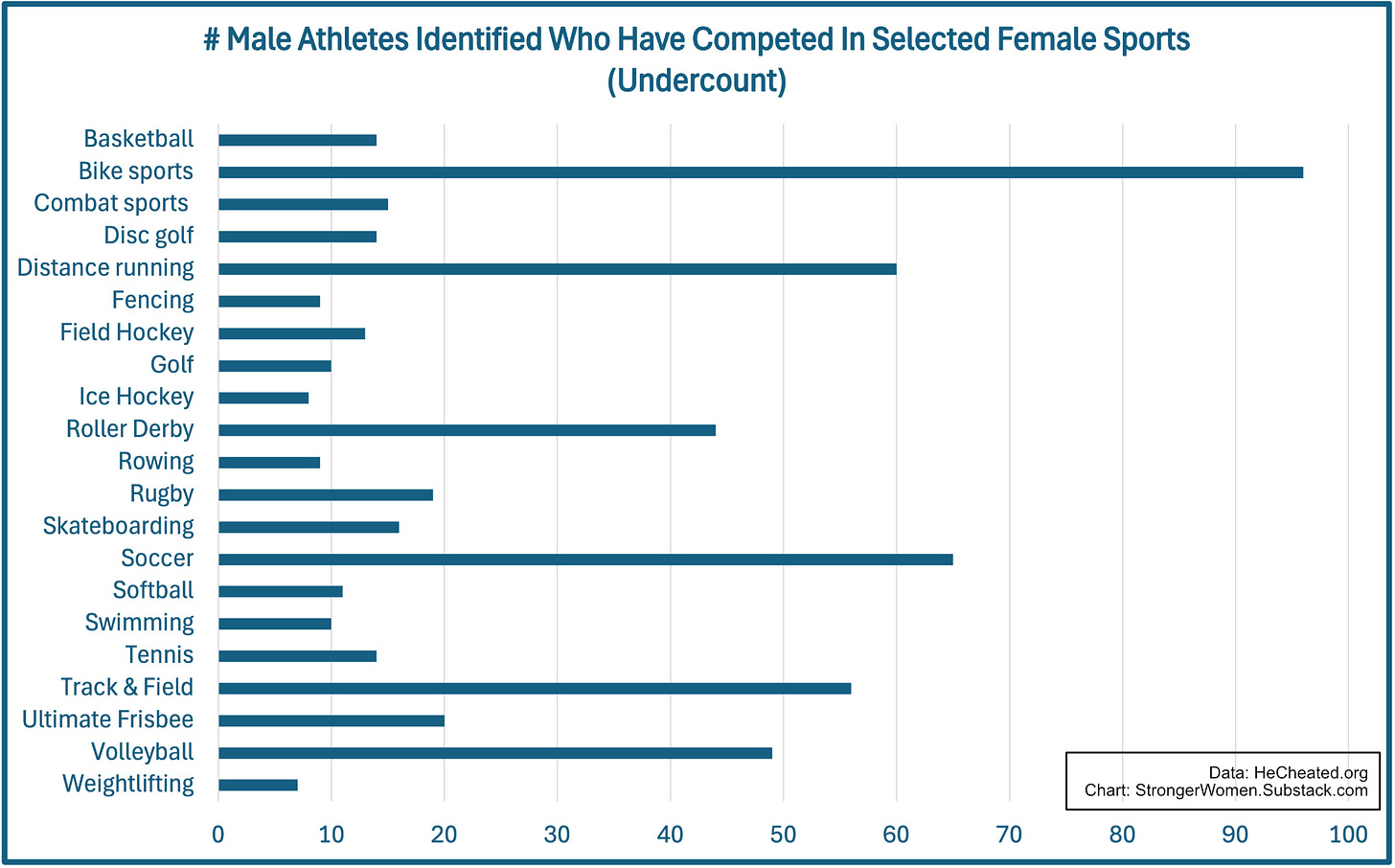
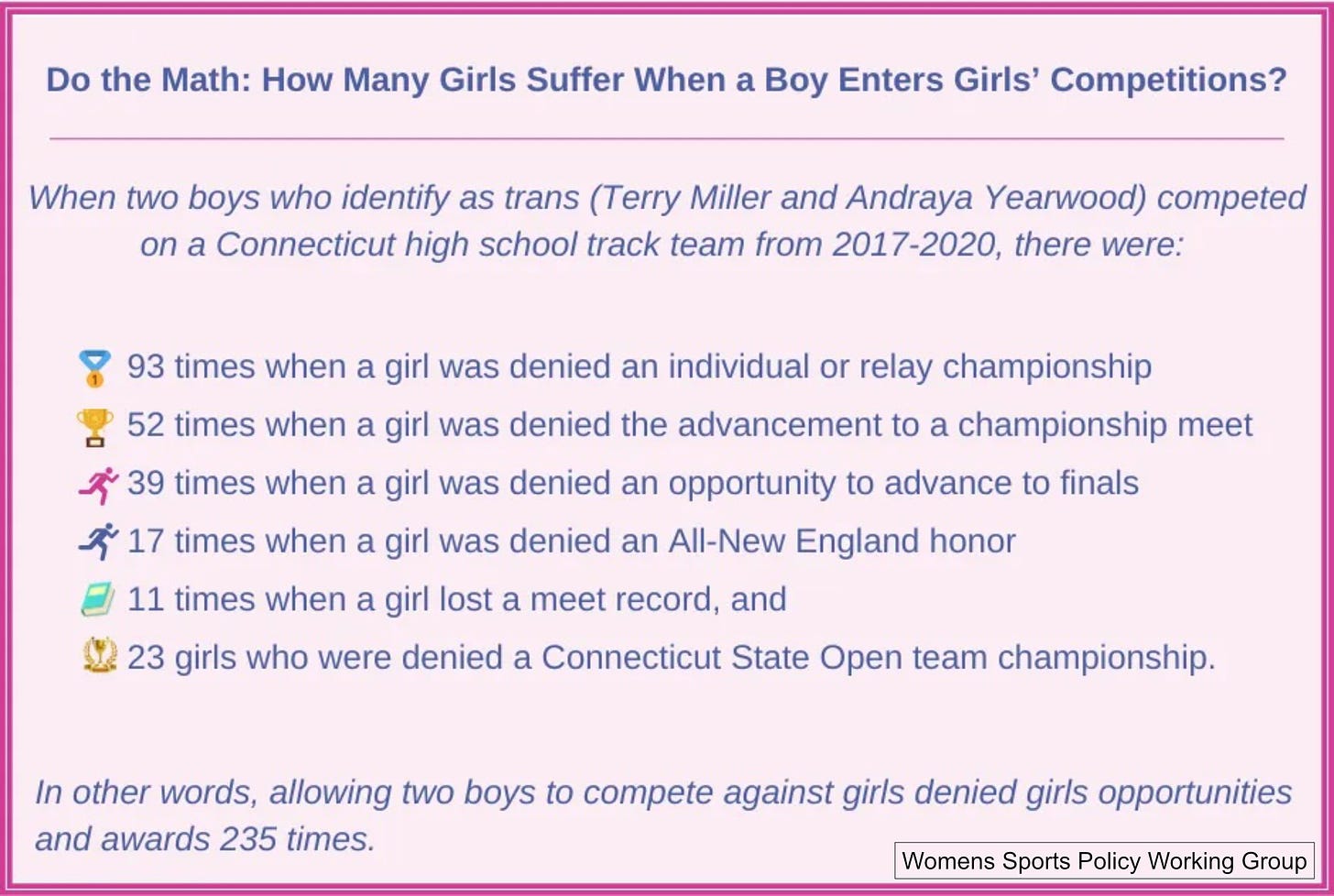
Just yesterday a coworker that normally has no interest in sports and I don't think ever golfed was telling me about a trans golfer that is winning in women's golf. Unfortonatly the stereo type is that men that ordinarily don't care about women's sports are the ones complaining about this. It's not fair but I think women are going to have to be the loudest on this.
I only expect it to become bigger as prize money and pro salaries go up for women's sports and certian less democratic countries chase more medals for national glory.
“But it doesn’t happen often” is even more true of white police gunning down unarmed Black men. Or anyone, for that matter.